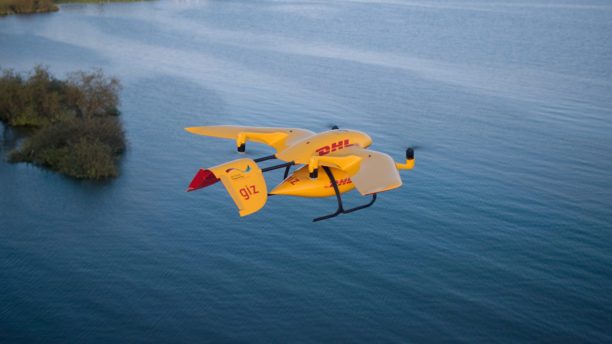DHL‘s ParcelCopter is the future of drone delivery – and the future for many on a Tanzanian island in Lake Victoria. DHL and German drone company Wingcopter have partnered on a successful trial of medical drone delivery. The successful project included more than 180 takeoffs and landings and over 2,200 km flown.
The following is from a DHL press release.
Revolutionising the delivery of medicines to remote areas using drones – the pilot project Deliver Future proves that it’s not science fiction. Three experts in their respective fields are making it happen: DHL, the Deutsche Gesellschaft für Internationale Zusammenarbeit (GIZ) GmbH on behalf of the German Federal Ministry for Economic Cooperation and Development (BMZ) and the German drone manufacturer Wingcopter. Over a six-month period, they successfully tested the delivery of medicines using a drone to an island in Lake Victoria. During the trials, the autonomous DHL Parcelcopter 4.0 completed the 60 km flight from the mainland to the island in 40 minutes on average. A total of 2,200 km were flown and roughly 2,000 flight minutes recorded during the pilot project.
The drone thus opens up new opportunities to adress the logistic challenges in the public health sector in many parts of Africa, especially supplying hospitals and pharmacies. Medical care for the roughly 400,000 residents of the Ukerewe island district of Lake Victoria, for instance, is severely limited. This is partly due to the poor infrastructure and difficult terrain. Six hours are needed to cover the overland route of 240 km. That makes it nearly impossible to provide emergency medication or to quickly refill cool chain commodities that are out of stock.
A key feature is that the DHL Parcelcopter 4.0 barely needs any infrastructure as it takes off and lands vertically. After delivering its cargo, it can easily be loaded with blood and laboratory samples to take back to the mainland. In future, the Parcelcopter could therefore not only improve logistics in the public health sector: it has the potential to help prevent crises worldwide, for example allowing an early response to slow the spread of viral diseases like Ebola.
Miriam McNabb is the Editor-in-Chief of DRONELIFE and CEO of JobForDrones, a professional drone services marketplace, and a fascinated observer of the emerging drone industry and the regulatory environment for drones. Miriam has penned over 3,000 articles focused on the commercial drone space and is an international speaker and recognized figure in the industry. Miriam has a degree from the University of Chicago and over 20 years of experience in high tech sales and marketing for new technologies.
For drone industry consulting or writing, Email Miriam.
TWITTER:@spaldingbarker
Subscribe to DroneLife here.

